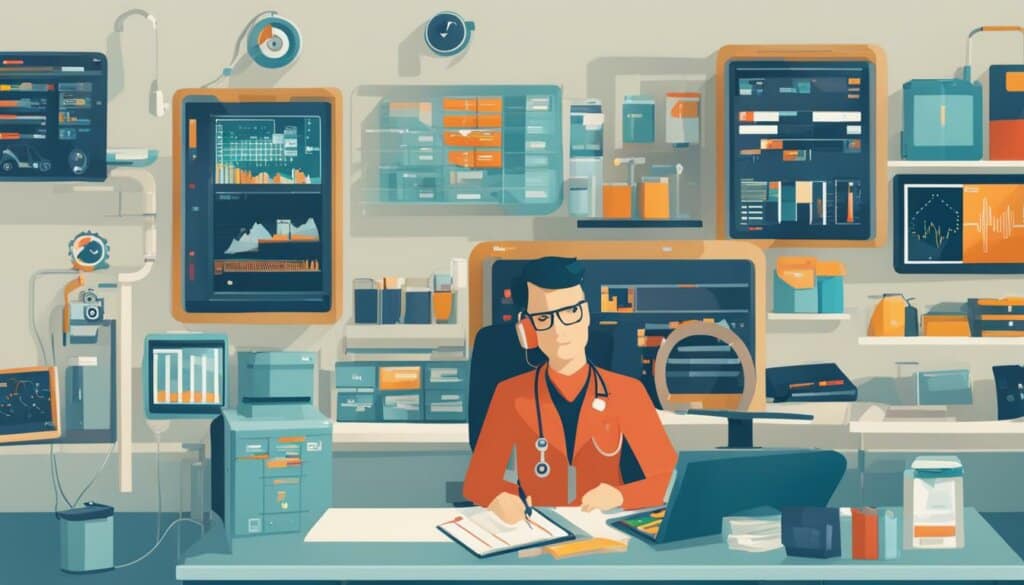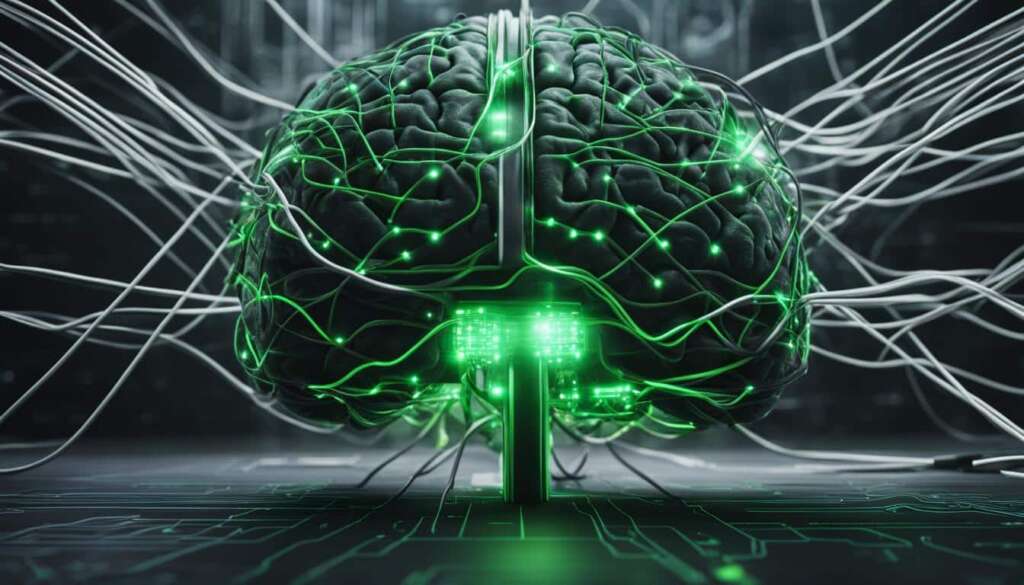Table of Contents
Welcome to our comprehensive guide on cognitive computing and its impact in today’s technological landscape. In this article, we will explore the fascinating world of cognitive computing, a field that combines artificial intelligence (AI), machine learning, natural language processing, and data analysis to simulate human thought processes in complex situations.
At its core, cognitive computing aims to create intelligent systems that can analyze vast amounts of data, learn from it, and provide meaningful insights. These systems have the ability to adapt, interact, understand context, and make informed decisions, revolutionizing human-computer interaction and automation across various industries.
Through cognitive computing, organizations can unlock the potential of their data, harnessing its power to gain a competitive edge. From healthcare and finance to retail and logistics, cognitive computing is transforming the way we work and interact with technology.
In the following sections, we will delve into what cognitive computing is, how it works, its applications across industries, its advantages and disadvantages, and explore its future potential.
Join us as we unravel the complexities of cognitive computing and discover how this remarkable technology is shaping the future of artificial intelligence, machine learning, and human-computer interaction.
What is Cognitive Computing?
Cognitive computing is a field that focuses on the development of computer systems capable of mimicking human intelligence and the workings of the human brain. One prominent example is IBM’s cognitive computer system, Watson, which is closely associated with cognitive computing. By leveraging artificial intelligence (AI) and other underlying technologies such as natural language processing and pattern recognition, cognitive computing has the ability to perform various tasks, including sentiment analysis, risk assessments, and face detection. Industries spanning healthcare, banking, finance, and retail can greatly benefit from the applications of cognitive computing.
How Cognitive Computing Works
Cognitive computing systems in the cognitive sciences combine data from various sources and use self-learning algorithms, data analysis, and pattern recognition to simulate human intelligence. By utilizing machine learning and processing vast amounts of structured and unstructured data, these systems can identify patterns, anticipate problems, and model possible solutions. For example, through exposure to thousands of pictures of dogs, an AI system can learn to identify pictures of dogs. The ability to adapt, interact, iterate, and understand contextual information is crucial in cognitive computing.
Examples and Applications of Cognitive Computing
Cognitive computing is revolutionizing various industries by enabling the analysis of vast amounts of data. Let’s explore some examples of how cognitive computing is applied in different sectors:
1. Healthcare
In the healthcare industry, cognitive computing plays a crucial role in improving patient care. By analyzing patient histories, diagnoses, and research articles, cognitive computing systems can generate recommendations and insights for medical professionals. These systems help healthcare providers make more informed decisions, leading to better treatment outcomes and improved patient satisfaction.
2. Retail
Retail businesses leverage cognitive computing to enhance the customer shopping experience. By analyzing consumer data, cognitive computing systems can provide personalized product recommendations based on individual preferences. This tailored approach improves customer satisfaction, increases sales, and fosters customer loyalty.
3. Banking and Finance
In the banking and finance industry, cognitive computing is utilized for analyzing vast amounts of unstructured data. This enables financial institutions to gain deep insights into customer behavior, detect fraud, and identify market trends. Additionally, cognitive computing powers the creation of intelligent chatbots, which enhance customer engagement and support efficient self-service banking.
4. Logistics
In the logistics sector, cognitive computing streamlines operations through efficient warehouse management and automation. By analyzing big data analytics, cognitive computing systems optimize inventory management, anticipate demand, and increase supply chain efficiency. This leads to cost savings, improved productivity, and faster order fulfillment.
5. Customer Service
Cognitive computing is revolutionizing customer service by offering intelligent chatbots and virtual assistants. These systems provide immediate and accurate responses to customer queries, ensuring round-the-clock support. By leveraging cognitive computing, businesses improve customer satisfaction, reduce response times, and free up human agents to focus on more complex tasks.
An Illustration of Cognitive Computing Integration in Industries:
| Industry | Application | Benefits |
|---|---|---|
| Healthcare | Analyzing patient data for recommendations and insights | Improved treatment outcomes, enhanced patient care |
| Retail | Providing personalized product recommendations | Increased sales, improved customer satisfaction |
| Banking and Finance | Analyzing unstructured data, creating chatbots | Improved fraud detection, enhanced customer engagement |
| Logistics | Optimizing warehouse management, automation | Cost savings, increased productivity, faster order fulfillment |
| Customer Service | Intelligent chatbots, virtual assistants | Improved customer support, reduced response times |

Advantages of Cognitive Computing
Cognitive computing offers several advantages in various aspects of business and customer interactions. Let’s explore the key benefits:
Analytical Accuracy
One of the primary advantages of cognitive computing is its ability to process and cross-reference structured and unstructured data with high analytical accuracy. By utilizing advanced algorithms and machine learning techniques, cognitive systems can extract valuable insights from vast amounts of information with precision. This analytical accuracy empowers organizations to make data-driven decisions and gain a deeper understanding of complex patterns and trends.
Business Process Efficiency
Cognitive computing excels in recognizing patterns within large datasets, enhancing business process efficiency. By automating repetitive and time-consuming tasks, cognitive systems can streamline operations, reduce manual errors, and optimize resource allocation. This improvement in efficiency allows businesses to allocate their resources strategically and focus on more critical aspects of their operations, driving productivity and profitability.
Customer Interaction and Experience
The contextual and relevant information provided by cognitive computing significantly enhances customer interactions and experiences. By analyzing customer data, cognitive systems can personalize interactions, anticipate needs, and provide tailored recommendations. This level of personalization fosters stronger customer relationships, increases customer satisfaction, and drives customer loyalty. For example, a retail company can utilize cognitive computing to offer personalized product recommendations based on a customer’s browsing and purchase history, significantly improving the overall shopping experience.
Employee Productivity
In addition to customer-centric benefits, cognitive systems can greatly enhance employee productivity. By analyzing data patterns and trends, cognitive computing enables employees to make informed decisions more efficiently. This empowers employees to focus on higher-value tasks that require human judgment and creativity while leveraging the capabilities of cognitive systems for data analysis and insights. Improved employee productivity leads to higher output, increased innovation, and overall organizational success.
Troubleshooting and Error Detection
Cognitive computing plays a significant role in troubleshooting and error detection. By combining data analysis and pattern recognition, cognitive systems can identify potential issues and anomalies in real-time. This proactive approach enables organizations to detect and resolve problems faster and more accurately. For example, in the manufacturing industry, cognitive systems can analyze data from various sensors to predict equipment failures, minimizing downtime and optimizing production efficiency.
In summary, the advantages of cognitive computing span across analytical accuracy, business process efficiency, customer interaction and experience, employee productivity, and troubleshooting and error detection. The utilization of cognitive systems can transform how organizations operate, make decisions, and engage with customers, ultimately driving growth and success.
Disadvantages of Cognitive Systems
While cognitive computing offers numerous advantages, it is important to also acknowledge the potential disadvantages associated with cognitive systems.
Cognitive systems heavily rely on large amounts of data for learning, which can make them vulnerable to cybersecurity breaches. As these systems continuously collect and process data, ensuring robust security measures becomes paramount to safeguard against potential threats.
The development cycle of cognitive systems can be lengthy due to their complexity. This can result in extended development times and hinder the adoption of cognitive systems, especially for smaller organizations with limited resources.
Additionally, the slow adoption of cognitive systems in certain industries and sectors is another potential disadvantage. The integration and implementation of cognitive systems require substantial time and effort, often requiring organizations to undergo significant transformations in their existing processes and infrastructure.
Moreover, the training and operation of cognitive systems consume significant power, leading to an environmental impact. The energy-intensive nature of cognitive computing, particularly in large-scale deployments, raises concerns about sustainability and carbon footprint.
“Cognitive systems heavily rely on large amounts of data for learning, which can make them vulnerable to cybersecurity breaches.”
“The development cycle of cognitive systems can be lengthy due to their complexity.”
“The slow adoption of cognitive systems in certain industries and sectors is another potential disadvantage.”
“The training and operation of cognitive systems consume significant power, leading to an environmental impact.”
Disadvantages of Cognitive Systems
| Disadvantages | Description |
|---|---|
| Cybersecurity Vulnerability | Cognitive systems’ reliance on large amounts of data makes them susceptible to cybersecurity breaches. |
| Long Development Cycle | The complexity of cognitive systems leads to lengthy development times. |
| Slow Adoption | The integration and implementation of cognitive systems can be slow, especially in industries and sectors that require significant transformations. |
| Environmental Impact | The training and operation of cognitive systems consume significant power, contributing to environmental concerns. |

Conclusion
Cognitive computing represents a significant advancement in the field of artificial intelligence and machine learning. By simulating human thought processes, cognitive systems bring a new level of intelligence to the digital world. These systems have the ability to analyze and interpret vast amounts of data, learn from it, and provide valuable insights that assist in decision-making.
The applications of cognitive computing are vast and have a profound impact on various industries. In healthcare, cognitive systems can analyze patient data and research articles to provide recommendations to medical professionals, improving patient care. In finance and retail, cognitive computing helps enhance customer interactions by providing personalized suggestions based on individual preferences. The logistics industry benefits from cognitive systems’ ability to automate processes and optimize warehouse management.
While there are challenges to overcome, such as cybersecurity risks and long development cycles, the potential benefits and capabilities of cognitive computing cannot be ignored. As this technology continues to evolve and gain wider acceptance, we can expect it to shape the future of human-computer interaction and data analysis. Cognitive computing is revolutionizing how we interact with machines and unlocking new possibilities for businesses across various sectors.
FAQ
What is cognitive computing?
Cognitive computing is the use of computerized models to simulate the human thought process in complex situations. It combines artificial intelligence (AI) and other technologies such as machine learning, natural language processing, and deep learning.
How does cognitive computing work?
Cognitive computing systems analyze and interpret large amounts of data, learn from it, and provide meaningful insights. They utilize self-learning algorithms, data analysis, and pattern recognition to simulate human intelligence.
What are the applications of cognitive computing?
Cognitive computing is widely used in healthcare, finance, retail, and logistics. It can analyze patient histories, provide personalized retail suggestions, analyze unstructured data in banking and finance, and optimize warehouse management in logistics.
What are the advantages of cognitive computing?
Cognitive computing offers analytical accuracy, improves business process efficiency, enhances customer interactions, aids in data analysis for employees, and enables faster problem-solving and error detection.
What are the disadvantages of cognitive systems?
Cognitive systems require large amounts of data making them vulnerable to cybersecurity breaches. They also have long development cycles and slow adoption rates for smaller organizations. Additionally, their training and operation consume significant power, resulting in negative environmental impacts.
What is the future of cognitive computing?
Cognitive computing is a transformative technology that will shape the future of human-computer interaction and data analysis. It will continue to evolve and gain wider acceptance, driving advancements in artificial intelligence, machine learning, and automation.













